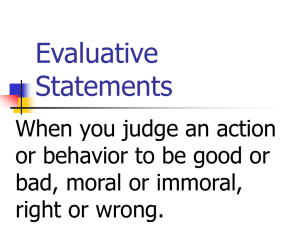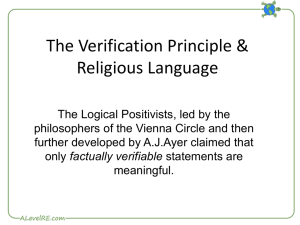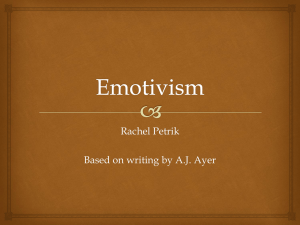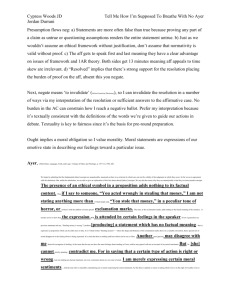Implications – Ayer (Grade A)
advertisement
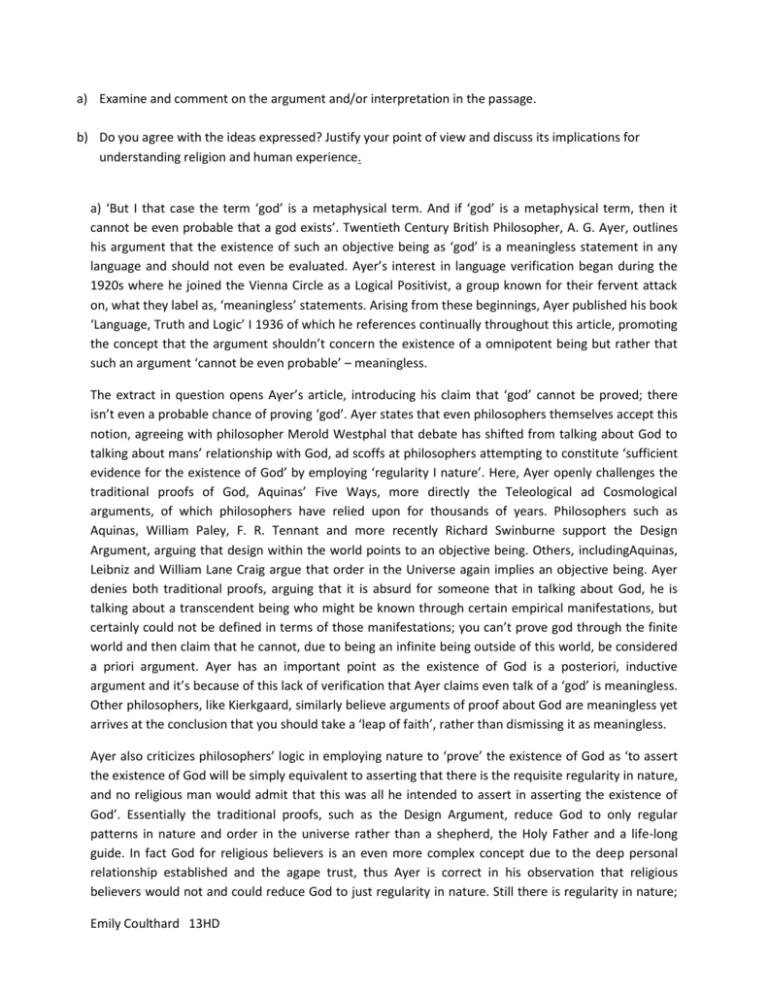
a) Examine and comment on the argument and/or interpretation in the passage. b) Do you agree with the ideas expressed? Justify your point of view and discuss its implications for understanding religion and human experience. a) ‘But I that case the term ‘god’ is a metaphysical term. And if ‘god’ is a metaphysical term, then it cannot be even probable that a god exists’. Twentieth Century British Philosopher, A. G. Ayer, outlines his argument that the existence of such an objective being as ‘god’ is a meaningless statement in any language and should not even be evaluated. Ayer’s interest in language verification began during the 1920s where he joined the Vienna Circle as a Logical Positivist, a group known for their fervent attack on, what they label as, ‘meaningless’ statements. Arising from these beginnings, Ayer published his book ‘Language, Truth and Logic’ I 1936 of which he references continually throughout this article, promoting the concept that the argument shouldn’t concern the existence of a omnipotent being but rather that such an argument ‘cannot be even probable’ – meaningless. The extract in question opens Ayer’s article, introducing his claim that ‘god’ cannot be proved; there isn’t even a probable chance of proving ‘god’. Ayer states that even philosophers themselves accept this notion, agreeing with philosopher Merold Westphal that debate has shifted from talking about God to talking about mans’ relationship with God, ad scoffs at philosophers attempting to constitute ‘sufficient evidence for the existence of God’ by employing ‘regularity I nature’. Here, Ayer openly challenges the traditional proofs of God, Aquinas’ Five Ways, more directly the Teleological ad Cosmological arguments, of which philosophers have relied upon for thousands of years. Philosophers such as Aquinas, William Paley, F. R. Tennant and more recently Richard Swinburne support the Design Argument, arguing that design within the world points to an objective being. Others, includingAquinas, Leibniz and William Lane Craig argue that order in the Universe again implies an objective being. Ayer denies both traditional proofs, arguing that it is absurd for someone that in talking about God, he is talking about a transcendent being who might be known through certain empirical manifestations, but certainly could not be defined in terms of those manifestations; you can’t prove god through the finite world and then claim that he cannot, due to being an infinite being outside of this world, be considered a priori argument. Ayer has an important point as the existence of God is a posteriori, inductive argument and it’s because of this lack of verification that Ayer claims even talk of a ‘god’ is meaningless. Other philosophers, like Kierkgaard, similarly believe arguments of proof about God are meaningless yet arrives at the conclusion that you should take a ‘leap of faith’, rather than dismissing it as meaningless. Ayer also criticizes philosophers’ logic in employing nature to ‘prove’ the existence of God as ‘to assert the existence of God will be simply equivalent to asserting that there is the requisite regularity in nature, and no religious man would admit that this was all he intended to assert in asserting the existence of God’. Essentially the traditional proofs, such as the Design Argument, reduce God to only regular patterns in nature and order in the universe rather than a shepherd, the Holy Father and a life-long guide. In fact God for religious believers is an even more complex concept due to the deep personal relationship established and the agape trust, thus Ayer is correct in his observation that religious believers would not and could reduce God to just regularity in nature. Still there is regularity in nature; Emily Coulthard 13HD the season, movement of the Sun; which points to a superior creator, like Cicero contemplated thousands of years ago ‘What can be more obvious when we look at the sky and contemplate… superior intelligence’. Nonetheless, philosophers, like Cicero, failed to recognize or ‘contemplate’ the obvious natural evil in the world. David Hume viewed this as an obvious flaw in the argument for the existence of God since how can an omnipotent, omnibenevolent being allow or create such evils as Tsunamis, earthquakes and volcanoes which claim on average 250, 000 people a year? Therefore, God is claimed to be many different things regarding nature yet cannot be reduced to just nature itself. Ayer understands and ridicules deep religious connections believers have with God. Ayer may seem to take the stance of an extreme atheist; however he himself distinguishes his beliefs from both atheists and agnostics as his ‘meaningless’ stance is ‘so far from being identical with… either connotations’. While atheists still discuss the existence of God despite this being in a negative light, Ayer utterly rejects any notion of a ‘god’; ‘God talk is evidently nonsense’. Therefore scientists such as Richard Dawkins who take an extremely negative approach to religion, calling it an ‘infectious disease’, are considered, by Ayer, as speaking ‘nonsense’, regardless of Dawkins’ reputation as an intelligent scientist. ‘Non-empirical is not an intelligible option’outlines Ayer’s Verification Principle; that if something cannot be verified then it is meaningless. Therefore if asked the question ‘Does God exist?’ Ayer would simply conclude that means nothing, he cannot reply, there was nothing asked, as God cannot be proved. Ayer believes that language can be clarified through the use of respected science, since science employs verification in order to prove and find evidence. Still, this is a very detached and emotionless view of the world which in turn mechanizes life itself. Additionally, John Hick states that it is possible to prove God in the Eschatological principle – when we die. Therefore ‘God-talk’ is no longer ‘evidently nonsense’ since God can be verified, in spite of you not being able to communicate proof to the living. Ludwig Wittgenstein tries to combat detached cognitive theory with cognitive theory. Wittgenstein’s language games theory states that language is meaningless to anyone outside of the ‘game’. For example, cricketers understand the meaning of such statements as ‘Armball’ or ‘Feather’ because they are in the ‘game’ whilst others who do not play cricket or have any interest in it would not understand these terms in the cricket sense; they are not in the game, the words have less or no meaning. Wittgenstein said ‘We need to be alive to the great variety of meaning’, yet this is only highlighting the problem of ‘meaning’, like Ayer, and doesn’t actually state what is and isn’t meaningful. Ayer rejects the argument that religious experience proves the existence of God; ‘the argument from religious experience is altogether fallacious’; as it is an experience many cannot effectively explain to others in words and to Ayer this is meaningless. You have to be able to express their experiences for them to be dubbed meaningful, yet experiences like giving birth cannot be successfully expressed in words but no one would label the birth of new life as meaningless. Many philosophers like Theresa of Avilla and Richard Swinburne believe in the religious experience argument still others like Freud agree with Ayer that speaking g of God is nonsense, Freud states ‘God is simply a creation of the human mind’. Emily Coulthard 13HD b) Ayer places all his faith in science, in the concept of verification and validation. To him anything that cannot be proved, validated, verified is meaningless or ‘nonsense’. This is a ridiculous conclusion. As the majority of aspects of human life contain unverifiable factors, emotions for instance, the view that these fundamental human concepts are meaningless is absurd. Any opinions placed on objects or people are meaningless. Thus, when Ayer has an opinion on verification, an opinion that cannot be verified itself, it fails by ‘a thousand qualifications’; resulting in its own hypocritical ruin. Ayer’s Verification Principle is extremely controversial when placed upon religion. Ayer would label all the ceremonies and scriptures as meaningless as they cannot be proved. Although it is too extensive to suggest that religion itself would then decay as a result of being regarded as meaningless, the majority of which would suffer greatly. Those who hold too much in store of religious experience, like the Christian Pentecostal Churches, and those who place too much favour in the scriptures and ceremonies, such as the Roman Catholic Church, would find themselves under attack via scientists as to the problem of verification. However, religion in this modern day and age is already repeatedly scorned by the media, scientists, particularly by comedians, suggesting that perhaps the acceptance of Ayers stance that ‘Godtalk is evidently nonsense’ would only boost the ratings of a particular comedic television show barely challenging religion at all. Still, Ayer would regard the comedians taunt at religion and God as meaningless in itself, implying all unverifiable statements as, in this analogy, a blank television screen – easily ignored and utterly pointless. Furthermore, Ayer concentrates too much on the downfalls of verification in religion and ignores completely the flaws in his chosen passion of science. Many validated theories provided by scientists, such as the world is flat and the smallest particle is the atom, have since been proved as wrong. Why is this weak use of validation acceptable to Ayer whilst verification via faith is considered implausible? Perhaps Ayer himself is biased towards science having grown up in an age when scientific discoveries were viewed assophisticated and fashionable. Or, more convincingly, Ayer would state that this is allowed because it CAN be verified, tested and validated. Faith has yet to find a test capable of proving its reality. Still, if such a machine was invented Ayer would indeedneed to reconsider and label the concept as meaningful, perhaps leading to every single religious believer having to be tested for Faith in God, but even then it is doubtful Ayer would take faith seriously. Despite distancing himself from atheists, it would seem Ayer would have more in common with Richard Dawkins rather than Richard Swinburne; Ayer is an unquestionably biased ‘non-atheist’. Ayer’s Verification Principle would have more of an effect on human experience than religion since every emotional statement would be considered meaningless. Something as minor as ‘this coffee is delicious’ to as major as ‘I love you’ would have equally no meaning. This is an absurd concept since an opinion on a cup of coffee never has the same effect as a declaration of love, yet all subjective unverifiable statements are nonsensical to Ayer. Without such opinions humanity would grow stale and mechanized. Only if something can be proved can it be acknowledged; such a world would be unbearable. Not only would religion be removed from conversation but emotions like happy, sad, nervous. The adoption of the verification principle would change all. Emily Coulthard 13HD Yet how can emotions be meaningless? By applying Wittgenstein’s theory of language games Ayer’s principle is challenged. Emotions such as those stated above are recognized worldwide, thus everyone is included in the language game – they are meaningful. Furthermore, under Ayer’s theory life would refuse to have meaning and lack purpose, having the potential to collapse society and result in anarchy. Still, many people believe that you do not need a belief in a superior being to act morally. Yet following Ayer’s principle may lead to a lack of morals. For instance, murder wouldn’t be considered be wrong. It wouldn’t be considered right either however, it would just exist as a verified fact of life. The ambiguity in what is moral could lead to a collapse in the law and government, as everyone’s opinion would be equal, equally meaningless, but still equal; the role of authority would be obliterated, leading to revolution or else mayhem. Conversely, by employing the example of murder, where 64% of such crimes (in the USA) are committed because of emotions like hate and jealousy, the number may actually be dramatically reduced since emotions have been eradicated from the list of capable motives. Ayer’s theory may actually bring a sense of calm, a repetitious cybernetic calm, but calm nonetheless. Ayer would imply such things as History verifiable and so meaningful, however history itself is ambiguous. There are some important parts of history that cannot be utterly proved like the motive for the Holocaust. Did it arise from a long-standing hatred of the Jews? Or was this one man’s lunatic and deathly idea? If so, why did only a small minority act against it? The rhetorical questions embody the soul of history – it is all theoretical. Additionally, many of the motives behind historical actions are made via unverifiable emotions, thus Ayer would, by forcing us to accept his theory, effectively eradicate the majority of the history of the human race. Genocide within itself. Moreover, many would argue that emotions are historically more important. Is the FACT that Hitler killed millions of Jews a more chief part of that historical era or the emotional response to it? The answer: memorials such as Cenotaphs and the Berlin Holocaust memorial and India’s India Gate are created out of remembrance, out of emotions, ‘Lest we forget’. Ayer seems to have forgotten this entirely. Perhaps we should just write how many soldiers died in each war on a slab of stone and leave it at that. Again, Ayer’s theory fails to encompass what makes humans essentially humans. To Ayer this entire essay as an opinion on his work, accept the statistic of murder, is meaningless. Ayer cannot test how I feel about his Principle any more than I can effectually describe my complete emotions surrounding his concept. Humanity to Ayer is the verified part – the evolvement. To most it is what we feel during our life time. If Ayer’s principle is accepted worldwide humans will have undeniably have evolved, but would have forgotten how to live in the process. Emily Coulthard 13HD
